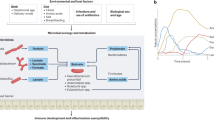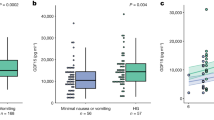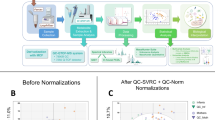Abstract
Objective: To determine the biochemical status of thiamin, riboflavin and pyridoxine in parturient mothers and their newborn infants in a Mediterranean region.
Design: Transveral study.
Setting: St Joan University Hospital and Faculty of Medicine & Health Sciences, Universitat Rovira i Virgili, Reus, Spain.
Subjects: 131 healthy parturient mothers, with normal pregnancies and deliveries in St Joan University Hospital, and their newborn infants.
Interventions: Erythrocyte haemolysates were prepared from maternal blood at delivery and infants’ umbilical cord blood and used to measure micronutrient status using the transketolase, glutathione reductase and aspartate aminotransferase coenzyme stimulation tests.
Results: Maternal and infant coenzyme activities were significantly correlated, but infant coenzyme status was better than maternal, with significantly higher basal and stimulated activity (P<0.001) and significantly lower activation coefficients (P<0.001). Inadequate thiamin, riboflavin or pyridoxine status occured in 38.2–62.6% (50–82) of the mothers and 3.1–37.4% (4–49) of the infants; 85.2% (46/54), 12.9% (4/31) and 24.1% (12/54) of infants born to mothers with biochemical deficiency of either thiamin, riboflavin or pyridoxine, respectively also had inadequate status. Maternal deficiencies in more than one vitamin further increased the risk of infant thiamin and pyridoxine deficiency. Maternal and infant riboflavin status were significantly correlated with fetal development (e.g. length at birth, P<0.001). The incidence of thiamin deficiency in paturient mothers in Spain was the highest out of a 12-country comparison.
Conclusions: Inadequate status for each vitamin was evident in mothers and infants. Maternal status of each individual vitamin, but especially riboflavin, was affected by maternal status of the other vitamins. Infant thiamin status was the most adversely affected by maternal deficiencies in more than one vitamin. Infant riboflavin status, however, was apparently protected from adverse maternal status.
Sponsorship: Hospital St Joan, Reus and Universitat Rovira i Virgili, Reus, Spain.
This is a preview of subscription content, access via your institution
Access options
Subscribe to this journal
Receive 12 print issues and online access
$259.00 per year
only $21.58 per issue
Buy this article
- Purchase on Springer Link
- Instant access to full article PDF
Prices may be subject to local taxes which are calculated during checkout
Similar content being viewed by others
Author information
Authors and Affiliations
Rights and permissions
About this article
Cite this article
Sánchez, D., Murphy, M., Bosch-Sabater, J. et al. Enzymic evaluation of thiamin, riboflavin and pyridoxine status of parturient mothers and their newborn infants in a Mediterranean area of Spain. Eur J Clin Nutr 53, 27–38 (1999). https://doi.org/10.1038/sj.ejcn.1600674
Received:
Revised:
Accepted:
Published:
Issue Date:
DOI: https://doi.org/10.1038/sj.ejcn.1600674
Keywords
This article is cited by
-
5-Methyltetrahydrofolate and thiamine diphosphate in cord-blood erythrocytes of preterm versus term newborns
European Journal of Clinical Nutrition (2013)



